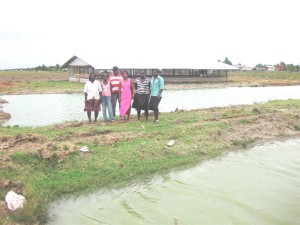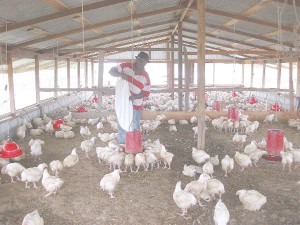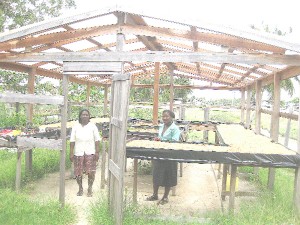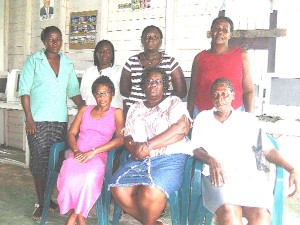-women at forefront of drive to make a living
Poverty and the lack of job opportunities for persons at Numbers 28/29 and 30 Villages have led a group of mostly women to venture into the rearing of tilapia which has already been guaranteed a Jamaican market.

Secretary of the Trafalgar/Union Community Development Committee (TUCDC), Lloyda Angus proudly told this newspaper during a tour to the fish farm last week that the group has six ponds consisting of three thousand red Tilapias.
She said the fish which had been placed in the pond in January weigh half and three quarter pounds but would have to attain a weight of one pound before they are ready for exporting.
She pointed out that the market was secured through a re-migrant, Lennox Johnson who operates a fish farm at Land of Canaan, East Bank Demerara and is also an exporter.
Angus said the fish farm which is located aback Number 29 Village is being overseen by a resident, Evan Carmichael who worked at fish farms at Guysuco and the Ministry of Agriculture.
According to Angus the group is also a member of the National Aqua-Culture Association of Guyana [NAAG]. Recently NAAG invited members of the group on a tour of a large-scale fish farming operation on the Corentyne where they were able to have a “first-hand look and information…”
She said they were also able to recognize some of their “shortfalls and would improve on our feeding methods.”

While the group is trying its best to make the project a success, they are having a difficulty in excavating more ponds to expand the fish farm.
She said a 20-acre plot of land out of a portion of 25 acres that had been acquired from the Mahaica-Mahaicony-Abary (MMA) scheme has been “untouched” because they could not afford the high cost involved.
Angus is appealing for government’s assistance in excavating the ponds and is optimistic that “if we get the help the community would become more economically viable and more persons would get employment.”
Further she lamented, “We do not have a problem with obtaining the fingerlings; all we are asking the government for is to assist us in excavating the pond.”
Currently the TUCDC is working with the Institute of Private Enterprise Development and the Inter-American Development Bank to install a bio-digester as a pilot project.
According to her the bio-digester would be fed with grass and cow manure to produce gas and the effluent would then be sent to a hassar pond. Duck-weed would also be cultivated in the pond and would be used to feed the livestock feed, thus cutting cost for the group.

Angus said that the TUCDC also has a processing plant and members intend to start processing salted fish. Johnson would be supplying the fish such as Bangamary, trout and snapper [which have not reached export quality] to the group for this purpose.
Markets for the salted fish have already been secured with business persons in the interior as well as shop owners in the community.
Three of the 14 members of the group recently attended a three-day aqua-culture training at the National Agricultural Research Institute [NARI] at Mon Repos on the East Coast.
Funding for the project was provided by the European Union [EU] after the group acquired the 25-acre land in 2006. The members are pleased that President Bharrat Jagdeo had assisted in “speeding-up” the application for the land.
Angus said that they had submitted a project proposal to the EU while waiting for the land application to be processed.
However they were told that they ought to have possession of the land before the proposal could have been approved and they subsequently approached the president.
Upon acquiring the land they were told by the EU that the group would have to raise 25% of the cost in order to qualify for the grant.
Members then decided to hold a fund-raising exercise. They were also forced to “sell shares. We sold 52 shares and were able to come up with the money for excavation costs” for the six ponds.
Poultry
According to Angus, the EU wanted to “fast-track the project and so at first we decided to start with poultry. But the market was stagnant; we found that buyers came up with prices that were not competitive.”
She said the group is now thinking of “plucking the chickens and marketing the meat to residents in the community” but they would first have to purchase freezers.
The poultry project which got started in September now has its third batch of birds.
The group has been given seven years to expand and sustain itself and if it fails to do so it would not be given other grants.
The idea of the fish farm was conceptualized in 2001 after the constitutional reform under the guidance of Sheila Holder and Eusi Kwayana who suggested that they apply for the land.
She said they were focusing on the economic venture as it was difficult for young people to find jobs and because most persons were economically challenged.

The first grant was approved by the Caribbean/African Self-reliant International (CASTRIES).
The group has also linked with the Inter-American Institute for Co-operation on Agriculture (IICA) and has gotten funding to renovate an old co-op building which was “infested with wood ants.”
The building currently houses the office and according to Angus, members earn a monthly stipend for “running the day to day affairs of the group.”
A greenhouse has also been set up at the back of the building and the members are involved in lettuce, celery, callaloo and tomato farming.
All of the produce is sold to residents in the community except for the lettuce which sold at the markets.
They group has also acquired computers from overseas-based residents and has been conducting computer classes for persons in the community.




